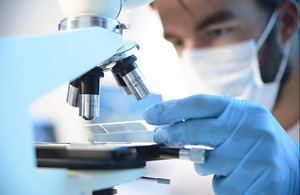World Health Organization confirms MHRA to continue playing vital role in ensuring the quality of global biological medicines
The World Health Organization (WHO) has confirmed the successful redesignation of the Medicines and Healthcare products Regulatory Agency (MHRA)’s Science and Research group as one of its Collaborating Centres for the Standardisation and Evaluation of Biologicals for the next four years.

This is critical for the work this group at the MHRA does on behalf of the WHO to develop, produce and distribute physical standards that are applied to assure the quality of biological medicines.
Biological medicines, such as vaccines, are among the most important medicines available in preventing killer diseases. Increasingly, newly developed biological medicines will play an important role in global healthcare, opening up many possibilities for the prevention or treatment of disease and illness. The work the Science and Research group at the MHRA does for WHO helps to ensure that patients across the world receive biological medicines of the highest quality.
The Science and Research group at the MHRA, and formerly the National Institute for Biological Standards and Control (NIBSC), was granted its first designation back in 1954, and is one of only four institutes worldwide that WHO designates as a custodian laboratory for its International Biological Reference Preparations.
MHRA Interim Executive Director for Science and Research Nicola Rose is the Head of the Collaborating Centre. Nicola said:
Biological medicines are an increasingly important part of healthcare. Our role as the UK medicines regulator is to make sure the medicines people take are of an acceptable quality.
Standards allow both the public and medical practitioners to have confidence in the quality of the medicines they use.
Standards also can help enable manufacturers make use of new and innovative technologies – ensuring patients receive the most advanced treatments possible.
MHRA experts carry out four main responsibilities:
-
Supporting WHO in developing, producing, and distributing international standards and reference materials for quality control and assurance of clinically relevant biological materials.
-
Conducting collaborative research to assure the quality of vaccines and other biologicals.
-
Providing technical input that may inform WHO when developing international written standards and guidelines for production and quality control of vaccines and other biologicals.
-
Contributing to WHO’s regional work to assure the quality and safety of vaccines and other biologicals through the provision of technical support and technical assistance to build capacities.